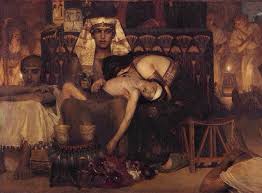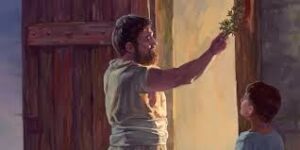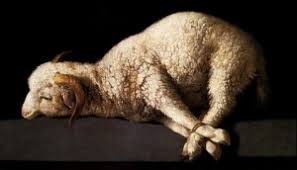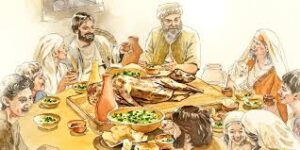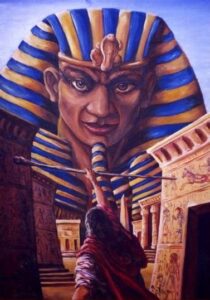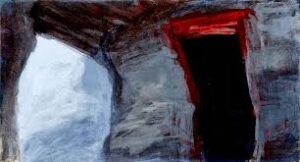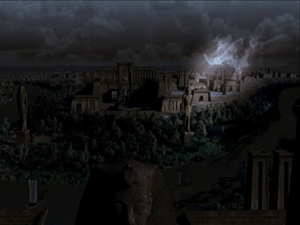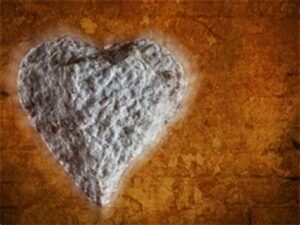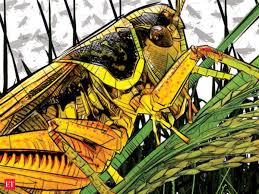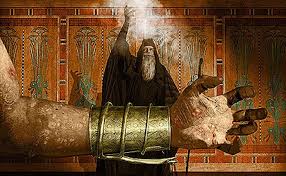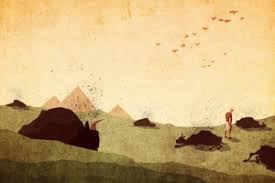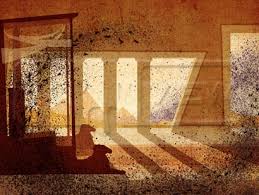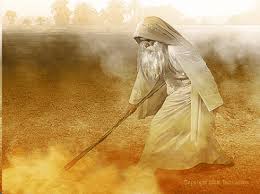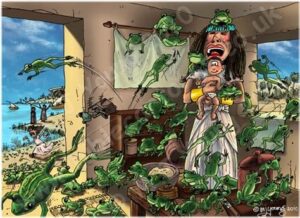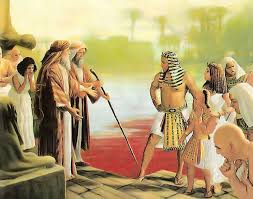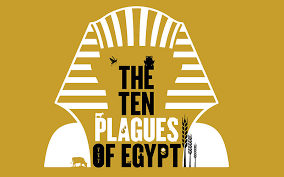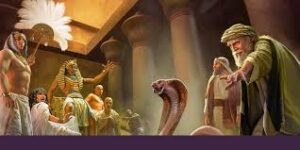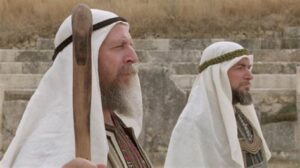Ca – At the End of the 430 Years, to the Very Day 12: 37-42
At the End of the 430 Years, to the Very Day
12: 37-42
At the end of the 430 years, to the very day DIG: As they left Egypt in haste, how do you think the Hebrews felt? The Egyptians? In the 430 years, whose patience was most tested – God’s or the Hebrews? Whose word was vindicated? Whose power was broken?
REFLECT: Egypt is symbolic of the world opposed to God (Revelation 11:8). We all have the same choice. Do we love the world (First John 2:15-17), or do we love God (Matthew 22:37)? Joshua said: Choose this day whom you shall serve, whether the gods of Egypt or the gods of the Amorites, but as for me and my household, we will serve the Lord (Joshua 24:15). Who is your first love (Revelation 2:4)? Have you left Egypt?
It was not until the blood of a lamb was shed that the redemption was affected. And as soon as it was shed, on the very day, Isra’el marched out of Egypt a free people. They were the Lord’s, bought with a price (First Corinthians 7:23), and that price was not bought with perishable things as silver and gold, but with the precious blood of the Lamb without blemish or defect (First Peter 1:18-19). One nation’s judgment became another nation’s redemption.
The date of the Exodus was 1447 BC (see the commentary on Deuteronomy, to see the clink click Ac – Deuteronomy from a Jewish Perspective: Date).
The Israelites journeyed from Rameses to Succoth to the south. We don’t know where Rameses was located, but we do know it was a storage city (1:11). There were about six hundred thousand men twenty years old or more aside from the women and children (12:37). This is a rounded number for 603,550 is found in 38:26 (also see Numbers 1:46-47, 2:32, 26:51). The term for men distinguishes them from all others. If each man had a wife and a minimum of two children, there would have been at least two million people. But because we know that most Hebrew families had more than two children, it is estimated that the size of the Hebrew population at that time was between two and three million.
Those large numbers can be supported in light of the explosion of growth during the lifetime of Joseph. But after he died, a new king who did not know about Joseph came to power. He was Ahmose, who expelled the Hyksos invaders from Egypt and founded the Eighteenth Dynasty. At that time the war against the Hyksos had just recently been won, but the Egyptians worried that if war with the Hittites broke out, the Israelites, with their great numbers of fighting men, would join their enemies, fight against the Egyptians and leave the country (1:10). But the Israelites were fruitful and multiplied greatly and became exceedingly numerous, so that the land had been filled with them (1:7).
But they were not the only ones to leave Egypt because a mixed multitude went up with them (12:38a NKJ). Mixture is a Hebrew word that is used of miscellaneous peoples who attach themselves to a group to which they do not naturally belong (Jeremiah 25:20, 50:37; Nehemiah 13:3). Some translations render this word foreigners, foreign people, or all who were of foreign descent.
However you want to say it, the mixed multitude were troublemakers. We learn about them in Numbers 11. Actually, they were a mixed race where an Egyptian man would have married a Hebrew woman, or a Hebrew man an Egyptian woman. The offspring of such a marriage had to make a decision: Will I leave Egypt with the Hebrews, or stay with the Egyptians? Many of the mixed multitude left, and many stayed. Those who left often wondered if they had made a mistake and when trouble and hardship came, they were the first to complain. They were not Israelites in the true sense of the word.224
The Hebrews left Egypt with large droves of livestock, both flocks and herds (12:38b). This literally reads a very heavy flock. As noted earlier, the Hebrew word for heavy, or kabed, defines what God had done to Pharaoh’s heart throughout the account of the exodus. As God made Pharaoh’s heart heavy, or hard, He likewise had made Isra’el heavy in material possessions.225
On the first leg of their journey, the Israelites baked cakes of unleavened bread with the dough they had brought from Egypt. The dough was without yeast because they had been driven out of Egypt and did not have time to prepare food for themselves (12:39). They believed that God would provide for their needs in the wilderness.

Now the length of time the Israelite people lived in Egypt was 430 years (12:40). At the end of the 430 years, to the very day, they left (12:41a). From the descent of Jacob into Egypt, to the death of Joseph, there were 71 years, from the death of Joseph to the birth of Moses, there were 278 years, from the birth of Moses to his flight into Midian, there were 40 years, from the flight of Moses to his return into Egypt, there were 40 years and from the return of Moses to the exodus, there was 1 year.
During the time of the patriarchs, God had told Abram that his descendants would be strangers in a country not their own and that they would be enslaved and mistreated for four hundred years (Genesis 15:13), but that in the fourth generation they would leave Egypt and start the return to their homeland (Genesis 15:16). Since a generation in Abram’s case would have been one hundred years, his age when Isaac was born (Genesis 21:5),226 the figures in Genesis 15 and Acts 7:6 (which also uses the four hundred years figure) would be intended as a rounded number on the low side.
On the other hand, Paul, in giving an overview of salvation history in the book of Acts, uses a higher rounded number. He said that in addition to the time they spent in Egypt, they would have endured about forty years in the desert before He would give their land to His people as their inheritance. He said: All this took about 450 years (Acts 13:16-20a). This higher round number of about 450 years included about forty years in the desert in addition to the four hundred years of slavery in Egypt.
This discrepancy between these different figures can be easily explained. The lower number of four hundred years (Genesis 15:13, 16 and Acts 7:6), and the higher number of about 450 years (Acts 13:16-20a) are both rounded numbers. One is rounded down and the other is rounded up. But the figure used here is an exact number: Now the length of time the Israelite people lived in Egypt was 430 years (12:40). We know it was an exact number because of the context. Moses would later write: At the end of the 430 years, to the very day, all ADONAI’s divisions left Egypt (12:41). This is not a general statement, nor does it use the word about. This means they left in an orderly manner.
So the Israelites did everything ADONAI commanded Moses and that is the way they set out, each with his own clan, family, and each under his own standard (Numbers 2:34; 2:17b). The order of the line of march was according to the order that they would later be encamped around the Tabernacle (see Ep – The Camp of the Twelve Tribes of Isra’el). The tribe of Judah would lead, followed by Issachar, Zebulon, Reuben, Simeon and Gad. Then would come Moses, Aaron and the Levites, followed by the tribes of Ephraim and Manasseh, the descendants of Joseph, then Benjamin, Dan, Asher and Naphtali.
ADONAI had kept vigil the night of the Passover to bring them out of Egypt the next day. He protected His people. Indeed, He who watches over Israel will neither slumber nor sleep (Psalm 121:4). And because He kept vigil over them, on this night all the Israelites are to keep vigil to honor ADONAI for the generations to come by observing the Passover (12:42). In contrast to God, who neither slumbers nor sleeps, Amenhotep II had to be awakened in the middle of the night to be told his son was dead (12:30). The sun god Ra was unable to come to the aid of his people. Where were the gods of Egypt?227
From this point on, the exodus becomes the high point of Jewish history. To this very day, the rabbis speak of God as the one who brought us up out of the land of Egypt. But that will change some day. “The days are coming,” declares ADONAI, “When men will no longer say, ‘As surely as ADONAI lives, who brought the Israelites up out of Egypt,’ but they will say, ‘As surely as ADONAI lives, who brought the Israelites up out of all the countries where he had banished them.’ For I will restore them to the land I gave their forefathers” (Jeremiah 16:14-15, also see Jeremiah 23:7-8). In the far eschatological future we are told that God will regather His people from all the countries where he had banished them for the final restoration during the Messianic Kingdom. That will become the highpoint of Jewish history.
The fact that God neither slumbers nor sleeps should be a great comfort for those who claim Him as their Savior. God is constantly looking out for our benefit. He continually maintains and sustains the universe, and He has eternal and everlasting care and compassion for His children. It doesn’t matter if someone was one of the righteous of the TaNaKh, or a New Covenant believer, all can take great comfort from the knowledge that their heavenly Father’s care is continuous. It has no end.228




